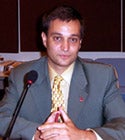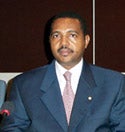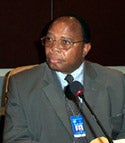Press Release
Communities in Crisis at High Risk of AIDS, Experts Stress
16 July 2002
Press Release
16 July 2002
UNITED NATIONS, New York - People uprooted by conflict, living in extreme poverty or caught in disaster's wake face a much greater risk of being infected with HIV, UN and NGO experts told a meeting here on Monday. The experts emphasized that resources currently available to combat HIV/AIDS in crisis-stricken communities are woefully inadequate and they warned that the epidemic is by no means under control, especially in conflict-ridden sub-Saharan Africa.

Aside from the lack of funding, the experts said, the greatest challenge of fighting HIV/AIDS is to inform and educate crisis-affected communities about the virus and prevent stigmatization of its victims. Ignorance and discrimination feed the epidemic by curbing open discussion and information efforts.
"We can only beat the HIV/AIDS epidemic if we can spread the truth about it faster than the virus spreads," said Dr. Alvaro Bermejo, head of the Health and Care Department at the International Federation of Red Cross and Red Crescent Societies (IFRC). "People must be able to openly discuss the epidemic and how to prevent infection. There is an immense lack of knowledge about the virus and people are not empowered with means and knowledge on how to fight it."
Dr. Bermejo warned that HIV/AIDS prevention is not yet a standard part of all humanitarian interventions and that many vulnerable populations are difficult to reach due to the lack of infrastructure and health systems in crisis-affected countries. He urged the international community to more effectively integrate HIV/AIDS prevention in its crisis response, to encourage governments to give more access to vulnerable populations, and to direct more resources to organizations that are able to reach them.
Dr. Bermejo also emphasized that civil society partnerships are indispensable in the fight because "all successes in curbing the spread of HIV have been achieved in close collaboration with local communities, which only amplifies the need to stop the culture of silence and discrimination".

Offering testimony about his work in war-torn Sierra Leone, Dr. Mamadou Diallo, the United Nations Population Fund (UNFPA) representative there, said that a prevalence survey conducted recently by the U.S. Center for Disease Control (CDC) has found the HIV virus in 4.9 per cent of people of reproductive age, just as the country is emerging from a decade-long conflict.
"The country is on the brink of a full-blown epidemic, denoted by 5 per cent infected," said Dr. Diallo. He pointed out that the war had been one of the most brutal on the planet, with the warring factions employing large-scale rape and abduction of women and girls as a weapon of war as well as amputation of limbs by machete. An exodus of skilled health workers has exacerbated the impact.
"Nothing is left standing in Sierra Leone except hope," Dr. Diallo said. The war has destroyed the basic infrastructure in the country and there is no such thing as a health care system. At the same time, thousands, possibly tens of thousands of girls and women were abducted and raped during the war, and many end up in big towns as commercial sex workers," Diallo said.
In Sierra Leone, UNFPA and other UN agencies and NGO partners are working to provide life-saving information, services and skills to three vulnerable groups: girls and women who were abducted and raped during the conflict, war affected youth, and UN peacekeepers and uniformed personnel. The programmes are limited to the capital Freetown but the government would like to expand them to all major towns.

In Zimbabwe, where 1.5 million adults are living with the virus, more than half of them women, the HIV/AIDS epidemic is exacerbated by a food crisis caused by economic recession, drought and political instability, said World Health Organization (WHO) Resident Representative Dr. E.K. Njelesani. He said that food shortages are causing desperation and displacement of populations, many to new settlements with no health facilities and little security.
"We are going to need a lot of support from the international community in Zimbabwe. As in much of southern Africa, it is the epicenter of the epidemic: infection is rampant, there is a drug shortage and generations of young people are at risk of contracting the virus. A massive, multi-pronged approach is necessary in order to build health care capacity and strengthen the national response'" Dr. Njelesani said.
Raising the issue of HIV prevalence among uniformed services, which tends to be far higher than that or civilian populations, UNAIDS Humanitarian Coordinator Ulf Kristoffersen told of a joint effort by UNFPA, the United Nations Department of Peacekeeping Operations (DPKO), IFRC and UNIFEM which aims to prevent HIV infection among peacekeeping troops and engage them in HIV prevention efforts.
"Young recruits are the most vulnerable to infection and they also represent a great opportunity to change the course of the epidemic. If educated and supported to be peer educators, they can be a powerful force for change because of their position and role in the community." Peacekeepers now carry HIV/AIDS awareness cards and peacekeeping missions have HIV/AIDS policy advisers.
Kristoffersen also warned that the global AIDS epidemic was still in the early stages and said the next few years would be critical. "We need to improve the economic and social conditions that propel the spread of HIV/AIDS and we need to release the resources that are required."
- - -
UNFPA is the world's largest multilateral source of population assistance, with programmes in 140 countries in 2001. Since it became operational in 1969, the Fund has provided some $5.6 billion to developing countries to meet reproductive health needs and support sustainable development.
Contact Information:
William A. Ryan
Tel.: +66 2 288 2446
Email: ryanw@unfpa.org